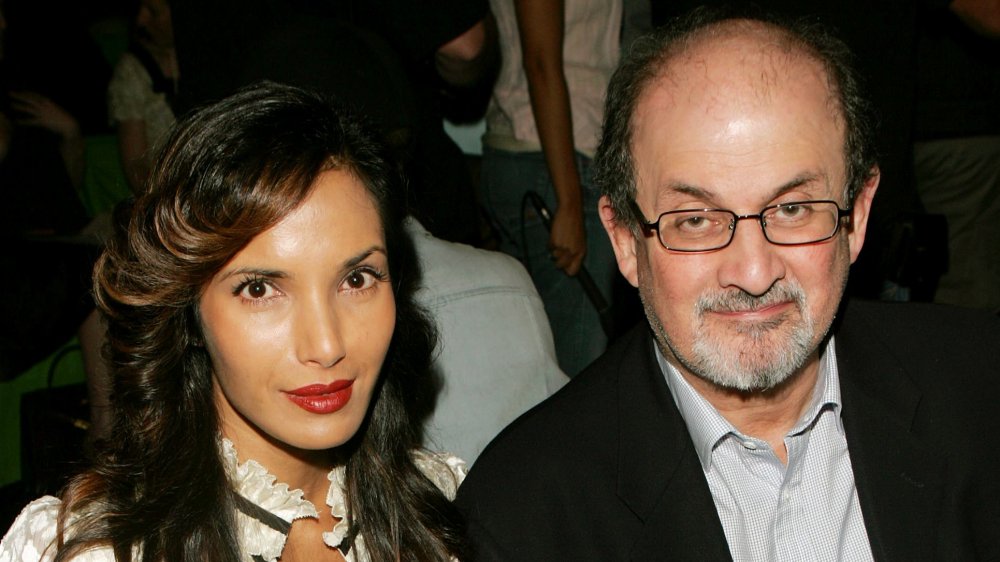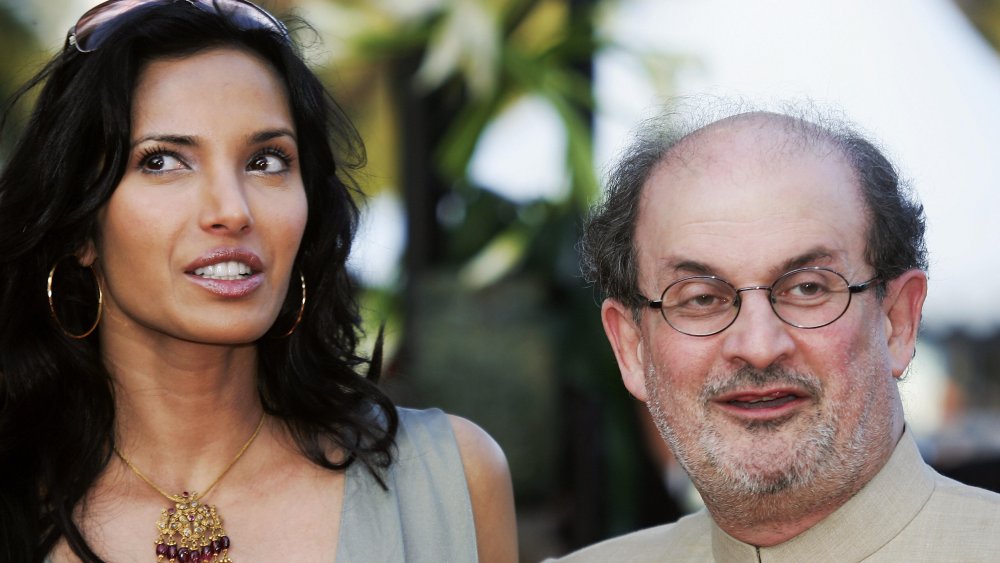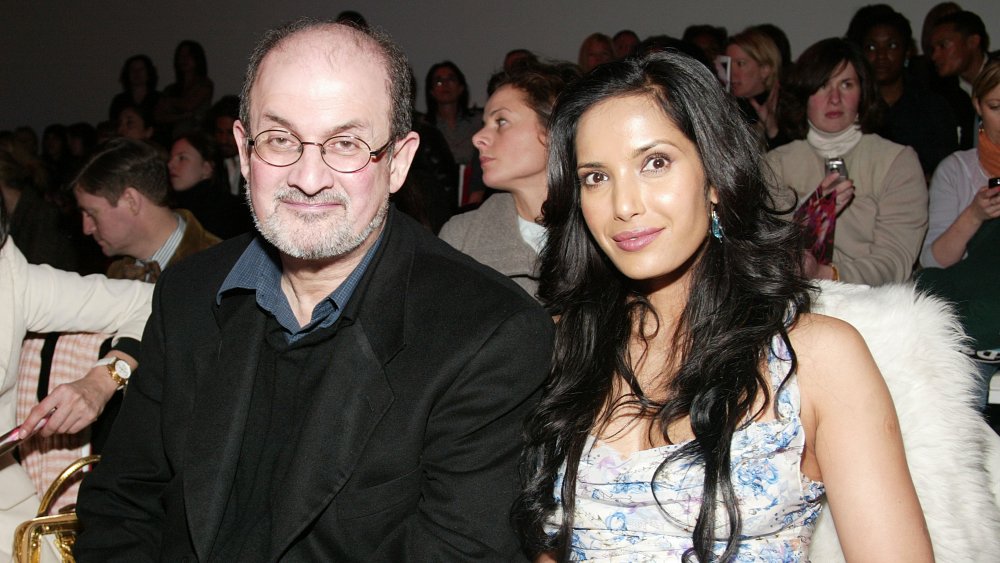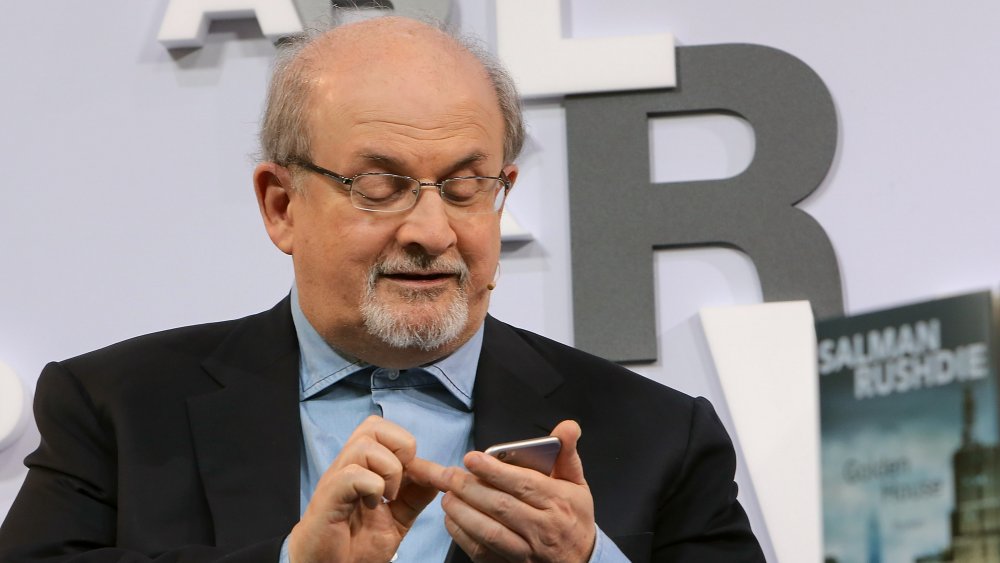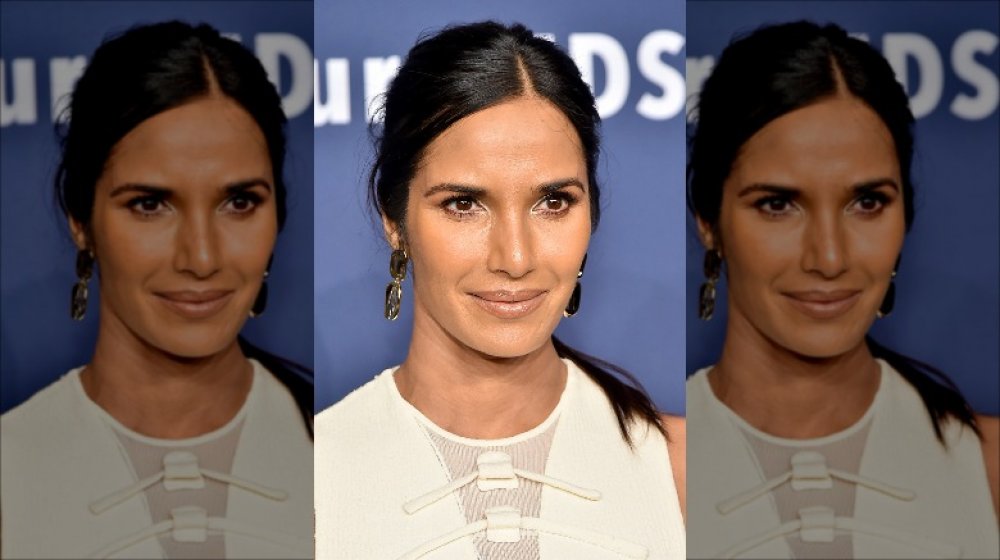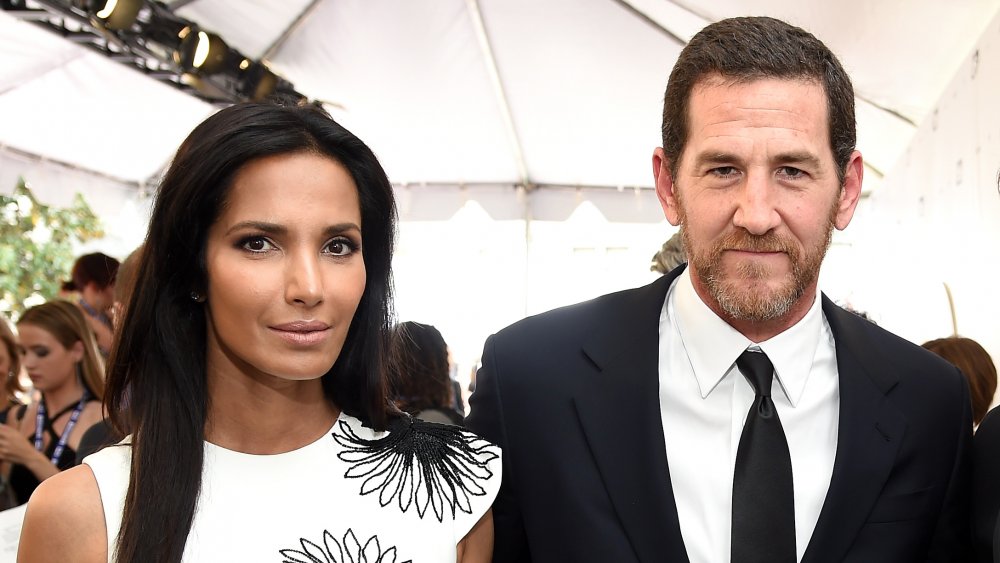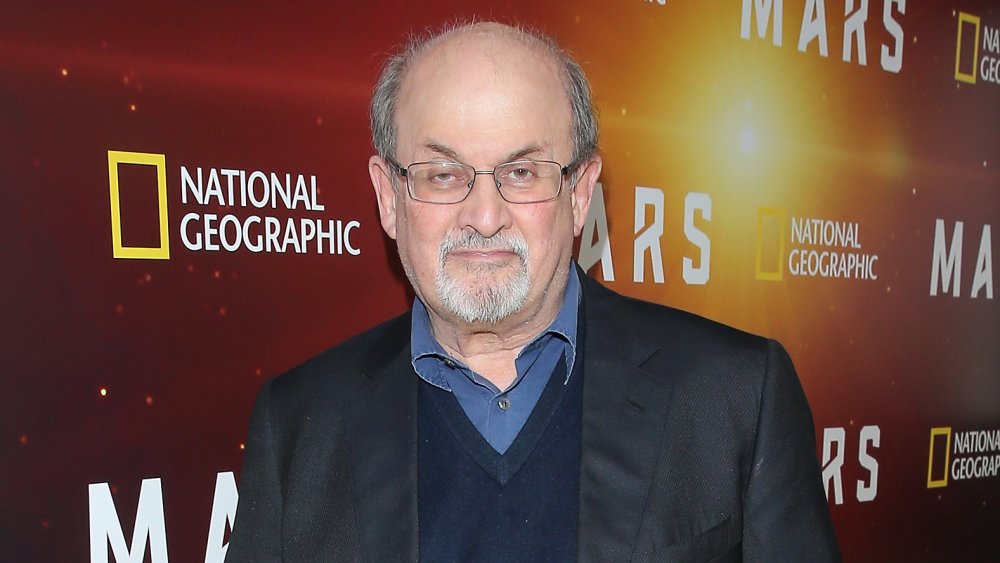The Truth About Padma Lakshmi And Salman Rushdie's Relationship
Though Top Chef star, model, and author Padma Lakshmi might appear to be the epitome of poise and grace — look no further than her stress-relieving cocktails, for instance (and how to chug them, naturally) — the India-born, New York City-raised culinary fan-favorite wasn't always able to glide through life with such ease.
Case-in-point? Her former relationship with award-winning author Salman Rushdie. Their turbulent marriage ended in divorce in 2007. After meeting at a party in 1999, both Lakshmi (then famous for being the self-described "first Indian model to have a career in Paris, Milan and New York") and Rushdie entered into a public courtship extensively documented by paparazzi and literati alike before calling it quits eight years later.
But while Lakshmi is far from the only celebrity chef to have had a rocky relationship within the public eye, hers might be one of the few in which both participants have written extensively about how things fell apart in dueling memoirs.
Padma Lakshmi and Salman Rushdie's relationship blossomed before withering into a nasty breakup
Before tying the knot in 2004, Salman Rushdie and Padma Lakshmi's years-long courtship was more often typified by tenderness than toughened animosity. On describing first meeting Lakshmi in his 2012 memoir Joseph Anton (which chronicles his life in the third-person during the years the Iranian government issued a fatwa over his head for perceived heretical content in his 1988 novel The Satanic Verses), Rushdie wrote in terms veering toward metanarrative portent.
"[H]e came face-to-face with Padma Lakshmi and at once he realized he'd seen her before, or her picture anyway, in an Italian magazine in which he, too, had been featured," Rushdie recalled (via Eater). Of course, even the renowned author couldn't help getting caught up in food-related cliches. "[He] remembered thinking, 'If I ever meet this girl my goose is cooked,'" Rushdie added.
Lakshmi also centered their early years together as halcyon: In her own memoir Love, Loss, and What We Ate (via the National Post), the Indian-American celebrity chef wrote of how Rushdie would make her breakfast in bed every morning — in retrospect, a delightful recurrence for someone deemed a worldwide professional foodie.
Unfortunately, their shared sweetness would eventually curdle into something far more bitter.
The marriage between Padma Lakshmi and Salman Rushdie ultimately soured
After exchanging vows, Padma Lakshmi came face-to-face with some hard truths about Salman Rushdie, whose self-regarded status as an author almost threatened to derail her own path to success. As Lakshmi put it in an interview with People, Rushdie's marital expectations were interwoven with his professional reputation — one with no room or patience for a career or identity divergent from one as his spouse.
"I just wanted my own identity," Lakshmi told the magazine in 2016. "But in order to do that, it required that I wasn't everywhere that he needed me to be."
According to Lakshmi's memoir (via the New York Times), cooking provided the confidence she sorely needed during her marriage to Rushdie: It allowed her to "keep her hands busy" around Rushdie's friends, becoming a way to express a different type of artistry that outstripped how her ex's writing would — until her memoir's success — cast a shadow over her own literary aspirations.
Food also yielded a sense of solace for Lakshmi after she and Rushdie parted ways in 2007. As the chef later recalled in the same book, the act of making chutney in their now-empty apartment on her first night alone was a type of therapeutic self-care. "I could lift myself, at least gastronomically, from the gray," she wrote of her newfound freedom.
Parting words between Salman Rushdie and Padma Lakshmi were far from their last
In a March 2020 interview with The Spectator, Salman Rushdie, currently a creative writing professor at NYU, had no apologies to offer regarding the portrayal of his ex-wife in Joseph Anton — almost eight years after its initial publication. "I didn't see it as score-settling," Rushdie said of his rendering of Padma Lakshmi, who Spectator editor Sam Leith admitted was one that painted her as "a narcissistic gold digger."
Paraphrasing a principle coined by the philosopher Jean-Jacques Rousseau ("you are going to do it, tell as much truth as possible, otherwise don't do it"), Rushdie contended that he was "just trying to say if you want to know about the life that I led, this is the life that I led at that time."
The award-winning author also stated he had shown a prior draft of the finished memoir to those portrayed, even unfavorably — among them Lakshmi, critic James Woods, and a number of friends "who had let him down during the fatwa" — and removed any text that the respective parties deemed inaccurate. "If they asked me to remove things, I removed them," Rushdie said in his defense. "I wasn't trying to get anybody."
But it turns out Rushdie isn't the only one who has written differing accounts of the three-year marriage.
For both Padma Lakshmi and Salman Rushdie, the pen is mightier than the sword
Salman Rushdie, who won the Booker Prize for his book Midnight's Children in 1981, said literary prizes "are very nice when you win and they don't matter when you don't" — a stark contrast from Padma Lakshmi's recollection of their years together.
In Love, Loss, and What We Ate (via The National Post), Lakshmi wrote of having to console her husband every time the Nobel committee announced that year's prize winner, none of whom were him. It's an example far from the first — and far less insidious and sinister — of many differing recollections.
According to Lakshmi, Rushdie was dismissive of her endometriosis — a painful chronic disorder in which uterine tissue grows outside of the reproductive system — after she was diagnosed with the condition in 2005. Rather than showing support for his ailing wife, who underwent extensive surgery at one point to remove scar tissue from her small intestine, the author apparently weaponized her condition, accusing her of wielding it as an "excuse" to avoid having sex, as well as calling Lakshmi a "bad investment."
Rushdie's inability to put her health before his own sexual needs were what ended the marriage, as per Lakshmi: "I was free to wallow in my malaise, and nurse myself without seeing the disappointment in his face," she later wrote.
Padma Lakshmi found love after her marriage to Salman Rushdie
Despite the emotional duress Padma Lakshmi underwent during the last few years of her marriage to Salman Rushdie, it did little to deter the Top Chef judge's continuing success in her career.
After divorcing in 2007, Lakshmi dove headlong into endeavors far outside the realm of television and modeling with the 2016 publication of her memoir, along with two other cookbooks (published in 2007 and 2016, respectively) and launching non-profit The Endometriosis Foundation of America, which she co-founded in 2014.
She also managed to find love, but not in the way you'd expect: As People reported, the author and chef gave birth to a daughter, Krishna, in 2010, fathered by a paramour post-Rushdie, the venture capitalist Adam Dell. Though both were broken up at the time of their daughter's birth, the couple eventually resumed a romantic partnership in 2017.
... Salman Rushdie, however, did not
As for Salman Rushdie? It seems that ever since his acrid divorce from Lakshmi in 2007, the author decidedly turned his attention away from romantic relationships and has since made work his sole focus, churning out a number of books in the ensuing years. Among them, Joseph Anton and his latest book — published in early 2020, it's a literary mashup of Don Quixote and the story of Pinocchio set in the modern era titled Quichotte.
"It's strange, given that I've been married four times, but I actually don't think marriage is necessary," Rushdie told the press in 2007 (via the National Post).
Without mincing words, and in a frame that doesn't bode very well in 2020, he added, "Girls like it, especially if they've never been married before — it's the dress. Girls want a wedding, they don't want a marriage. If only you could have weddings without marriages."

